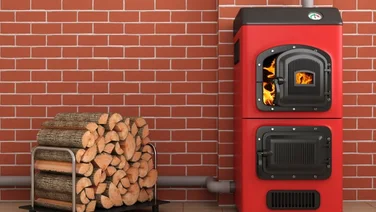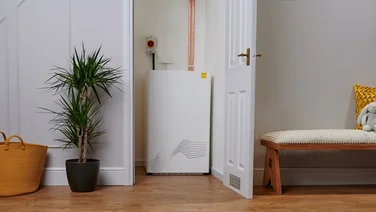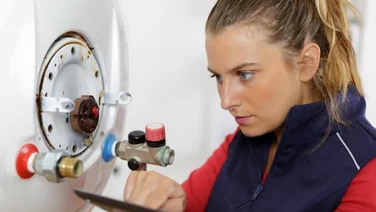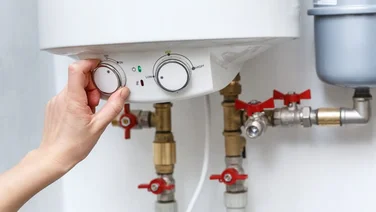We receive a small fee from trusted installers when you request a quote through our site. This helps us keep our content independent, well-researched and up to date – Learn more
Looking for alternative ways to heat your home after the government announced its gas boiler ban? You’re certainly not alone.
Many people are turning to biomass boilers to keep their homes warm – but at what cost? Generally, you’ll be looking at an average cost for a new boiler of £16,000, including installation.
But the overall price tag comes down to the size and type of biomass boiler that you go for, as well as the manufacturer that you choose.
If you find biomass boilers aren’t for you, there are still plenty of boiler options available. To find the best boiler deals out there, simply fill out this short form and let us do the hard work. We’ll pass your details onto our trusted suppliers, who’ll then get in touch with their best prices.

What is a biomass boiler?
Similar to conventional gas boilers, biomass boilers provide space heating for an entire property.
However, unlike gas boilers, biomass boilers don’t need fossil fuels to generate heat. Instead, they burn wood pellets, chips, or logs, which are all made from either sustainably sourced wood pellets, plants, or other organic matter.
A stove burns these logs, chips, or pellets to heat a single room – and also may be fitted with a back boiler to provide water heating.
You can either get a biomass boiler that you have to top up manually, or a version with an automated feed hopper, which will supply the machine with additional wood at regular intervals.
Want to learn more? Check out our complete guide on biomass boilers.
How much does a biomass boiler cost?
You can expect the average biomass boiler to cost roughly £16,000 – but this will fluctuate, depending on a few factors.
Cheaper models can cost around £12,000, but won’t provide as much warmth as a larger model. On the other hand, you could splash out and pay about £22,000 for a boiler that can heat an extremely large home.
How much you’ll pay for a biomass boiler will depend on several factors, including the size, make and level of automation of the boiler you choose. Manually fed log boiler systems, for example, will be cheaper than automatically fed pellet boilers.
Below, you can see just how much size and automation impacts the overall price of biomass boilers:
| Type of biomass boiler | Average price range |
|---|---|
| Small manually fed log boiler | £10,000–£13,000 |
| Large manually fed log boiler | £13,000–£16,000 |
| Small automatically fed pellet boiler | £15,000–£21,000 |
| Large automatically fed pellet boiler | £22,000–£31,000 |
Of course, if you’re swapping your current boiler for a greener alternative, biomass boilers aren’t your only option.
So, how do they compare to other heating systems?
| Heating system | Average price range |
|---|---|
LPG boiler | £600–£2,500 |
Gas boiler | £3,800–£4,200 |
Electric combi boiler | £3,000–£3,700 |
Solar thermal | £3,000–£5,000 |
Air source heat pump | £7,000–£13,000 |
Biomass boiler | £12,000–£20,000 |
Ground source heat pump | £24,000–£49,000 |
How much does it cost to run a biomass boiler?
Unlike electric and gas boilers, which run on a tariff, biomass boilers have to be refilled with fuel. There are three types of fuel you can choose from, which all range in price:
| Type of biomass boiler fuel | Estimated price per tonne |
|---|---|
| Chips | £95 |
| Logs | £140 |
| Pellets | £190 |
A small house in the UK should only need two to three tonnes of pellets per year, but a larger home could need closer to four or five.
That means a large house could end up costing £950 a year to run – which sounds like a lot, but is pretty low compared to the current price cap on owners of gas boilers.
Different types of biomass fuels have their pros and cons, and will suit different properties. Want to learn more about the advantages of chips, logs, and pellets? Head to the bottom of the page, where we discuss this in more detail.
Again, before investing in a biomass boiler, you might want to consider how these prices compare to other types of fuel. To help you with this, we’ve outlined different energy costs for various power sources.
| Fuel | Average cost in England, Scotland, and Wales (pence/kilowatt-hour) |
|---|---|
Electricity | 30.11 |
Gas | 7.51 |
LPG | 12.1 |
Oil | 9.2 |
Wood pellets | 7.9 |
Data from Energy Saving Trust, January 2023
It’s these cheap costs that make biomass boilers more affordable than other alternatives, despite the hefty upfront costs.
However, the amount you’ll save will depend on what you’re swapping it for. For example, the Energy Savings Trust suggests that people replacing an LPG heating system with a wood-burning system will typically save £700 per year, while anyone replacing an electric heating system with a biomass boiler will save £1,000 per year.
To compare how much you could save with a biomass boiler, check out the chart below:
Data from the Energy Savings Trust, 2023
Are there any government grants available?
Some homeowners can get a discount on a biomass boiler through the Boiler Upgrade Scheme.
Unfortunately, the Renewable Heat Incentive (RHI) ended in March 2022, though you can still access RHI payments if you signed up in time.
The Boiler Upgrade Scheme
Originally named the Clean Heat Grant, the Boiler Upgrade Scheme is a government scheme that’s set to run until March 2025.
Aiming to help households transition from gas boilers to low-carbon alternatives, this initiative will offer a voucher to cover the upfront cost of renewable technologies, such as air source heat pumps, ground source heat pumps, and biomass boilers.
Participants could receive up to £5,000 towards a biomass boiler – but only if they live in a rural area. So, unfortunately, if you live in a built-up town or city, this option might be off the table.
The Renewable Heat Incentive
The Renewable Heat Incentive was a government initiative that subsidised the running costs of biomass boilers, heat pumps, and solar water heating.
Anyone able to get access to the RHI before the scheme ended in March 2022 will receive quarterly payments for seven years, based on the amount of electricity your system is estimated to produce.

What’s the carbon footprint of a biomass boiler?
Let’s get one thing straight: biomass boilers, whilst greener than some options, still emit large amounts of CO2.
Biomass boilers fuelled by wood pellets – the most common kind in the UK – emit 0.052 kg of greenhouse gases per kWh. We worked out that since the average home requires 13,600 kWh per year for heating, that means biomass boilers could emit 707 kg of greenhouse gases per year.
Despite this, biomass boilers – like log burners – still release significantly less emissions than their fossil fuel counterparts. In fact, the Energy Savings Trust suggests that people who swap their old coal-fired system for a biomass boiler can save up to 11.6 tonnes of CO2 per year.
See how much CO2 you could save by switching to a biomass boiler in the graph below:
Data from the Energy Savings Trust, 2023
The different types of biomass boiler
Wood chip boilers
Chips come from wood that is too small to be used in industry. This type of fuel has a lower energy density than pellets, but is slightly better than logs.
Generally, you’ll find that these chips are used to heat larger buildings or groups of houses.
Bear in mind that extra care should be taken when using recycled wood, as there is a high risk of contaminants such as formica, plastics, and paint.
Log boilers
Logs are more suitable for smaller households. Unlike some other biomass boilers, log boilers have to be filled with wood by hand and require considerably more manual work.
You’ll also need a lot of logs to heat a whole house, which will need to be manually loaded at least once a day.
Pellet boilers
Pellets are also better suited to small- to medium-sized properties. These are much easier to use and control than logs, since they can run automatically in the same way as gas or oil boilers.
However, you’ll generally find that pellets are much more expensive than wood chips and logs. It’s also important to source good quality pellets, as some biomass boilers can reject certain types.
These pellets are often made from either wood chips, bark and sawdust, grass, peanut shells, or rice and wheat straw.
Next steps
If your current boiler is coming to the end of its life, it’s time to start thinking about whether a biomass boiler could be a good new addition to your home.
If you find that biomass boilers aren’t for you, there are still plenty of boiler options available. To find the best boiler deals out there, simply fill out this short form and let us do the hard work. We’ll pass your details onto our trusted suppliers, who’ll then get in touch with their best prices.









